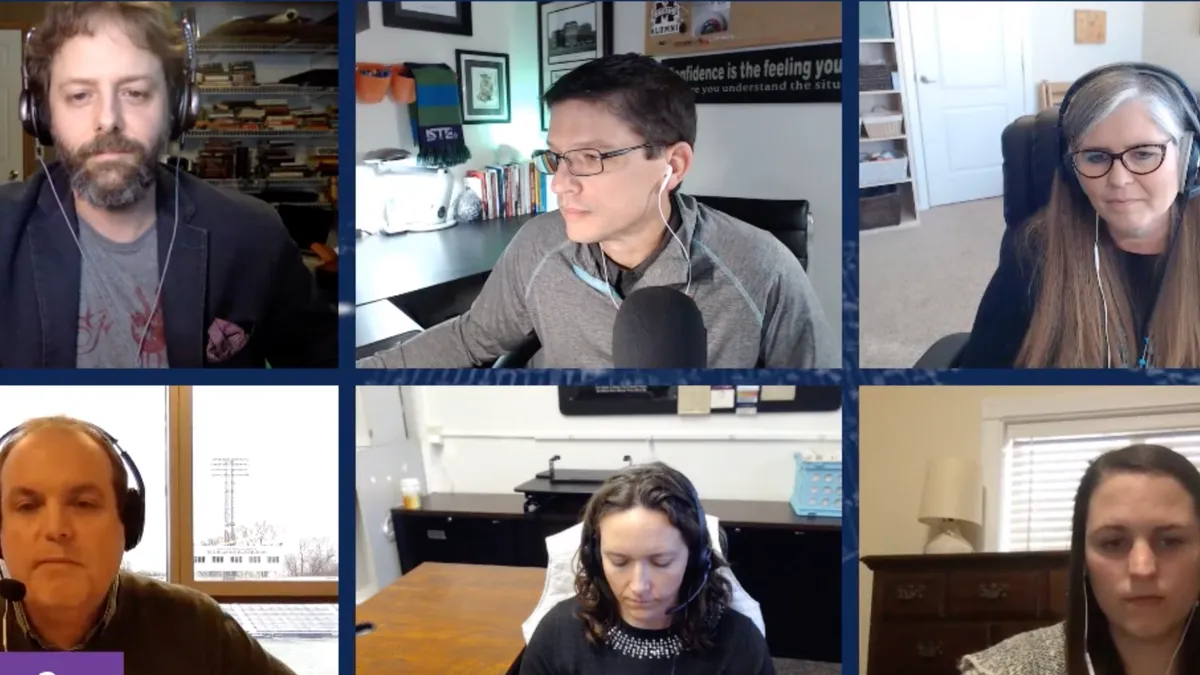Dive Brief:
-
District-based education technology coaches are having a harder time building relationships with teachers and parents during hybrid and socially distanced learning formats, but those connections are critical for helping students progress during the pandemic, according to a virtual panel of coaches speaking during the annual International Society For Technology in Education conference Tuesday.
-
The ISTE panelists said they have built relationships with teachers and parents by hosting virtual office hours, making presentations about learning management systems and through collaborations on problem-solving tasks.
-
During the pandemic, the coaches said they have focused not only on improving access and understanding of LMS programs, but also on strengthening academic lessons through high-tech and low-tech efforts.
Dive Insight:
A school or district technology coach is sometimes the only person in that position in the building or school system, which means they need to be resourceful, reliable and available. The pandemic has made those traits even more important, the panelists said.
Much of the coaches’ focus this year, they said, has been balancing basic technology support with partnering with educators to amplify learning in remote and hybrid formats.
“A lot of very quick learning had to happen for us to dive into the LMS but then we also realized we needed to have a balanced approach to learning to use the platform and everything that we were going to use in our remote learning environment wasn’t going to be enough,” said Kris Armijo, an education technology coordinator with the Moriarty-Edgewood School District in Moriarty, New Mexico. “We need to have a focus on the pedagogy and what the best practices looked like in blended and online environments.”
Tech tools such as podcasts and digital storytelling are also being used to engage online learners, said the coaches. The Franklin City school system in Franklin, Ohio, for example, uses Gizmos for online and in-person math and science simulations, according to Amy Hudson Estepp, an educational technologist for the district. The tech coaches also pointed out that teachers have been innovative with creating hands-on lessons for remote learners using items students may have around their homes, such as an egg for an egg drop experiment.
The coaches said they have used various strategies to build relationships and trust with teachers, students and families who are working in different learning formats and whom the coaches may have never met before in-person. Stephanie Howell, a middle school instructional technology coordinator for Pickerington Schools in Pickerington, Ohio, said she uses personality-type surveys from CanWeTalkEDU to understand the best ways to communicate and consult with individual teachers based on their work styles.
“I didn’t know many of the teachers in [the buildings] and if it wasn’t for this personality test ... I think I would have struggled a lot,” Howell said.
Ed tech coaches aren’t just concentrating on technology for learning, the panelists said. Their districts also are using online programs to monitor the physical and mental well-being of remote students. Armijo said her district uses CloseGap.org, which supports personal emotional awareness and understanding. “You can learn a lot from those daily check-ins with students,” Armijo said.
Another panelist, Jason Gay, a library media specialist at Highlands High School in Fort Thomas, Kentucky, said prioritizing relationships with teachers, students and families is essential during the public health crisis.
“The strengths of those relationships you have with teachers when you’re there for them in the hard times, the same with the kids, that will definitely pay it forward,” Gay said. “That’s what’s going to carry schools forward is building those relationships and fostering it and being there for people.”







 Dive Awards
Dive Awards






